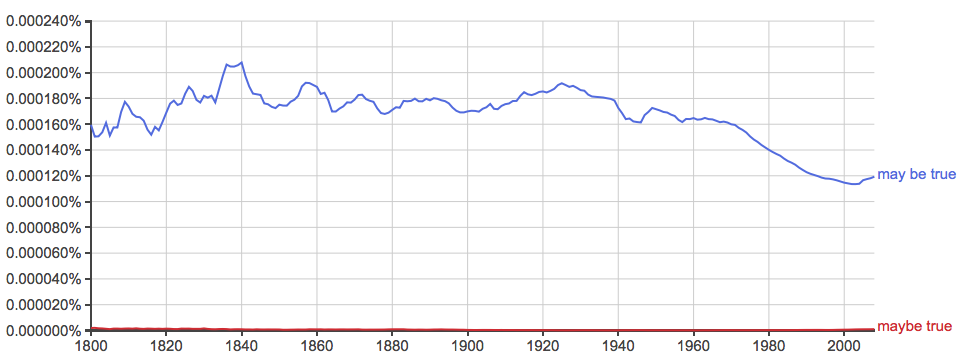Слайд 1Teacher Resource Disc
Slide shows for use with
PowerPoint presentation software
Betty Schrampfer
Azar
Stacy A. Hagen
Laurette Poulos Simmons
Copyright © 2007 by Pearson Education, Inc.
All rights reserved.
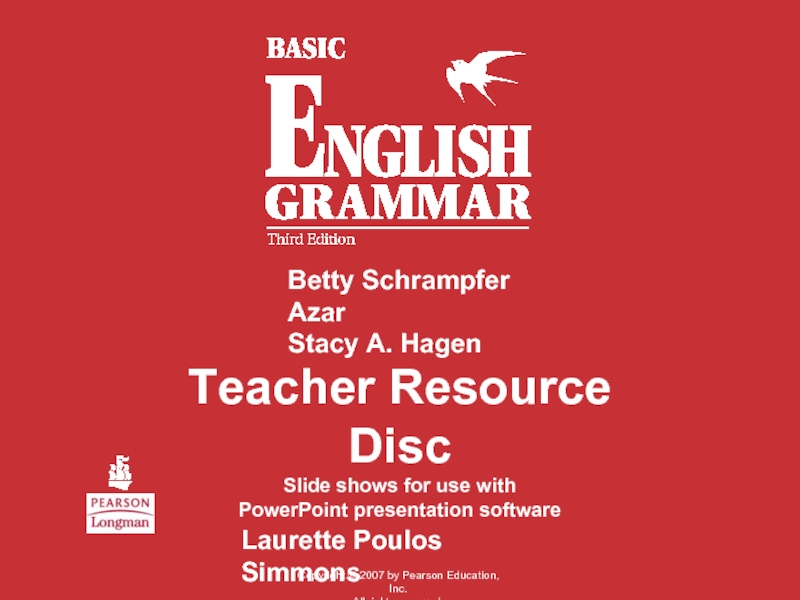
Слайд 2
11-1 May / Might vs. will
11-2 Maybe (one word) vs. may be (two
words)
11-3 Future time clauses with before, after, and when
11-4 Clauses with if
11-5 Expressing habitual present with time clauses…
11-6 Using what + a form of do
CONTENTS
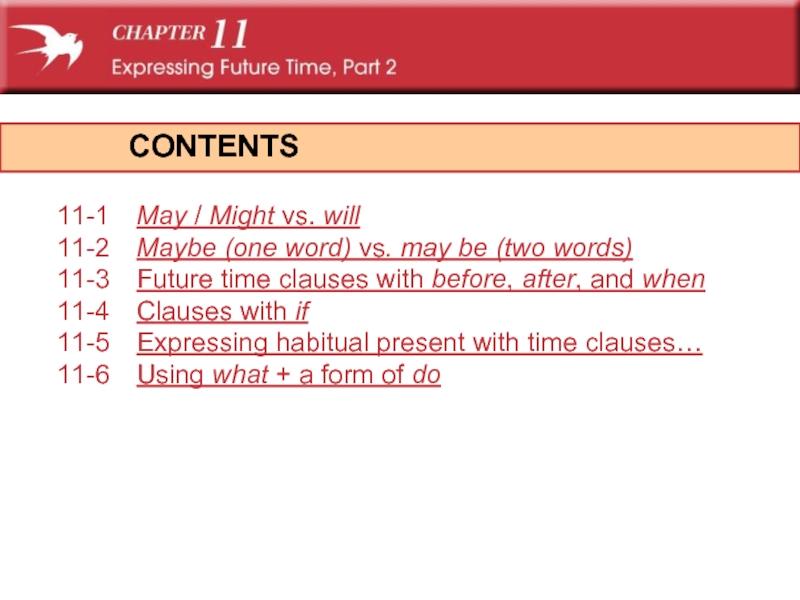
Слайд 3It may rain tomorrow.
11-1 MAY / MIGHT vs. WILL
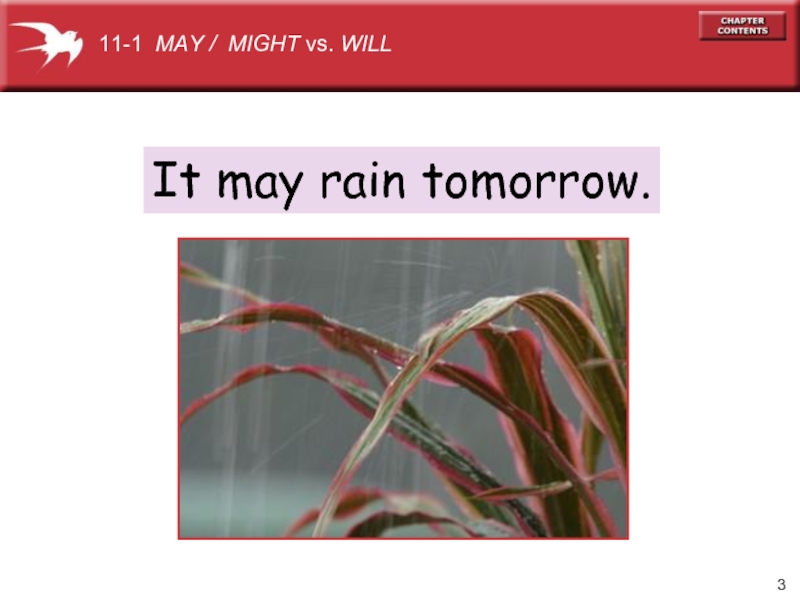
Слайд 4(a) It may rain
.
May + verb
future
tomorrow
11-1 MAY / MIGHT vs. WILL
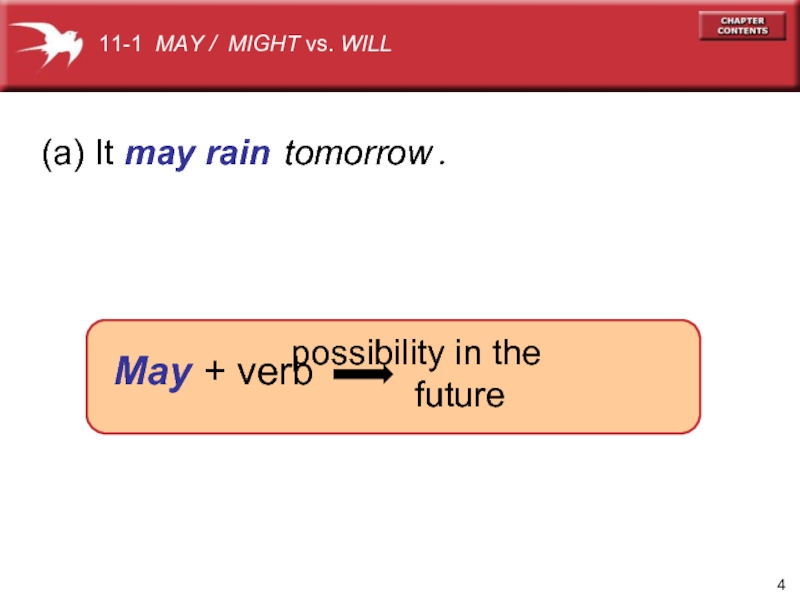
Слайд 5(a) It may rain
(b) Zoe may be at school
May + verb
future
or
tomorrow .
now.
11-1 MAY / MIGHT vs. WILL
present

Слайд 6(a) It may rain
(b) Zoe may be at school
tomorrow.
now.
(c) It might rain tomorrow.
(d) Zoe might be at school now.
may = might
11-1 MAY / MIGHT vs. WILL
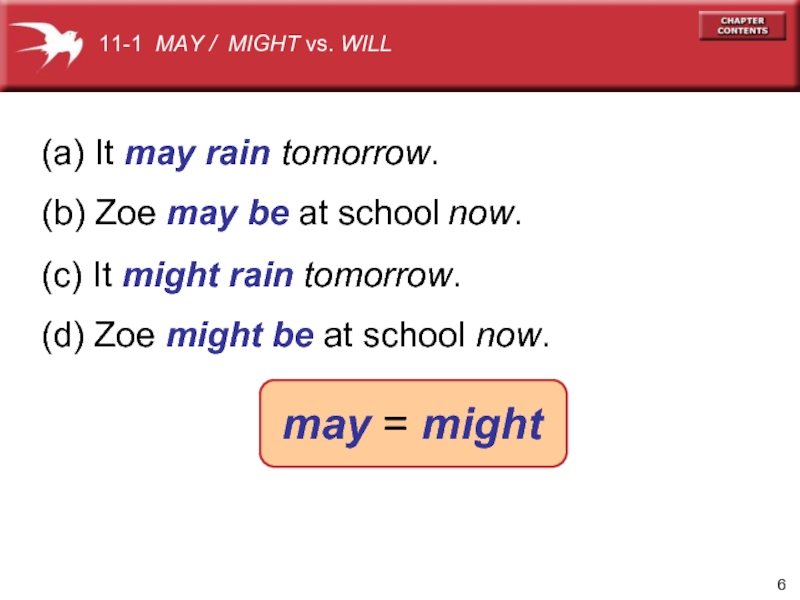
Слайд 7(a) It
(b) Zoe at school
tomorrow.
now.
(c) It tomorrow.
(d) Zoe at school now.
may rain = might rain
11-1 MAY / MIGHT vs. WILL
may rain
may be
might rain
might be
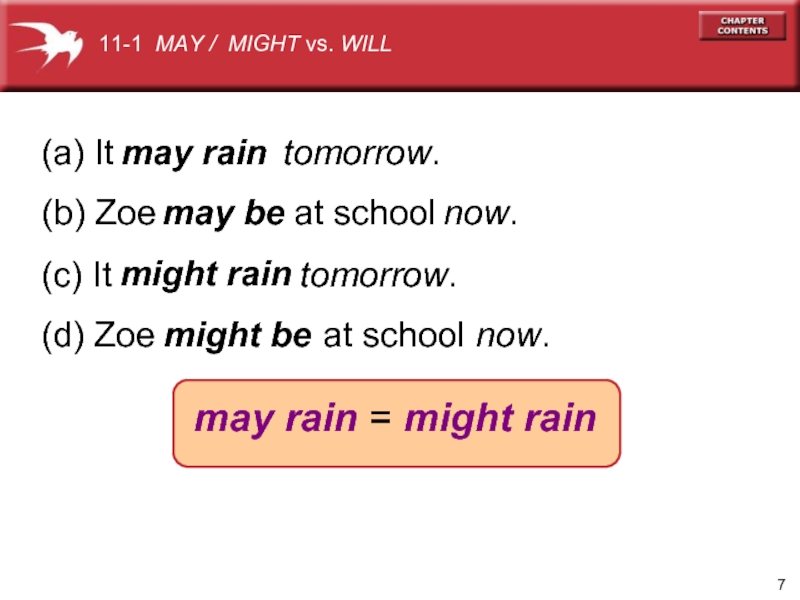
Слайд 8(a) It
(b) Zoe at school
tomorrow.
now.
(c) It tomorrow.
(d) Zoe at school now.
may be = might be
11-1 MAY / MIGHT vs. WILL
may rain
may be
might rain
might be
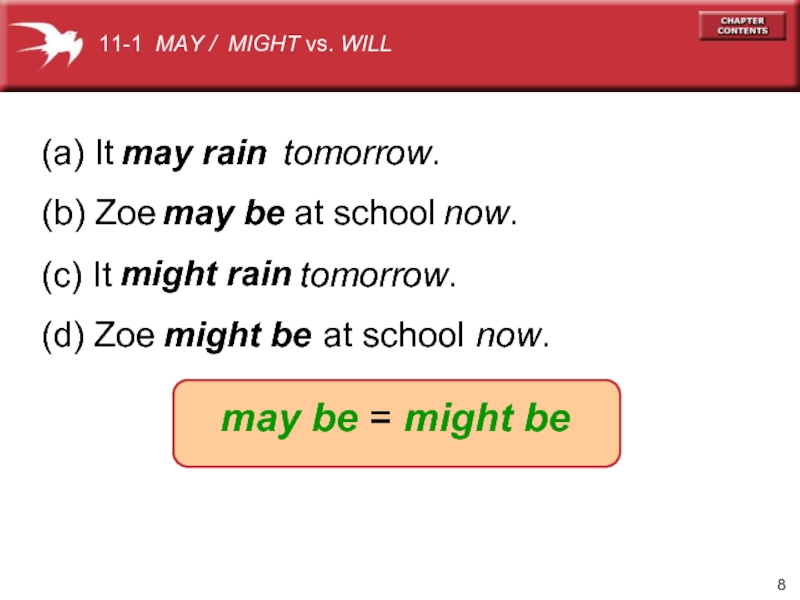
Слайд 9(e) Mr. Lee will be at work tomorrow.
(f) Theresa may /
might be at the party tonight.
speaker doesn’t
may / might be
know
speaker feels
will be
sure
11-1 MAY / MIGHT vs. WILL
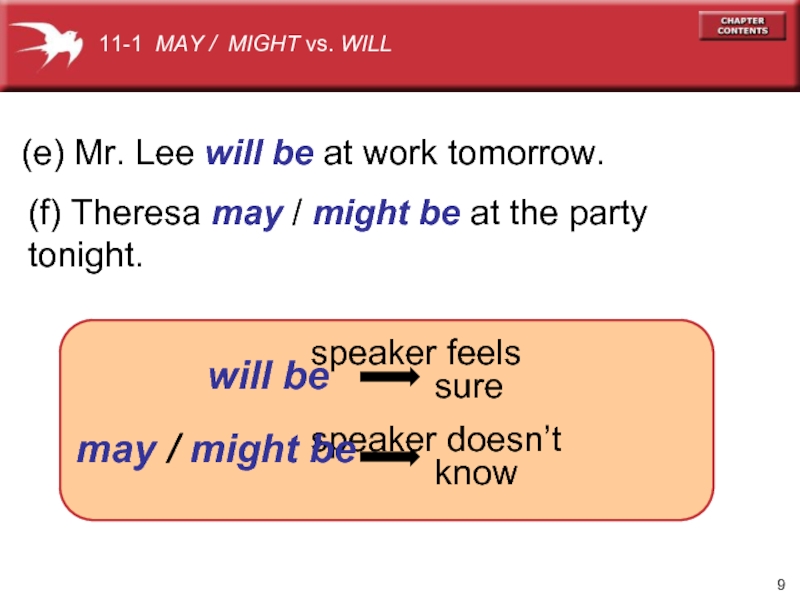
Слайд 10
(f) Theresa may
be at the party tonight.
Theresa may / might not be at the
party tonight.
may / might + not
11-1 MAY / MIGHT vs. WILL
may be
may not be
might not be
NEGATIVE
similar
meaning

Слайд 11Theresa may will be at the party tonight.
Theresa might will
be at the party tonight.
?
?
11-1 MAY / MIGHT vs. WILL
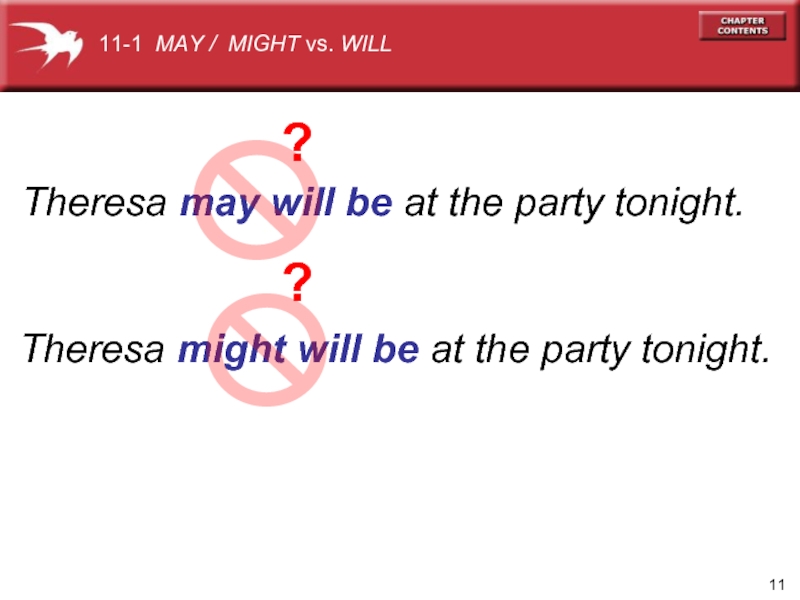
Слайд 12 I will be 35 years old on Monday.
not sure
sure
11-1
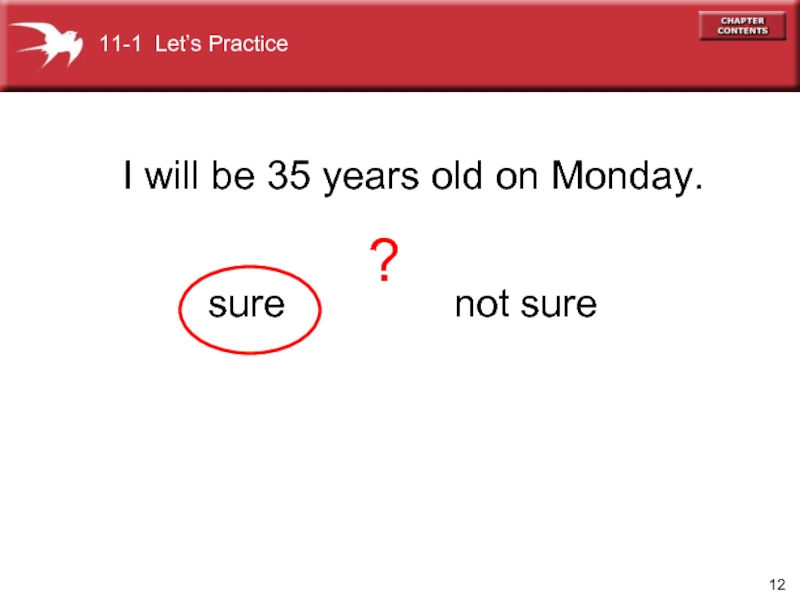
Слайд 13 Adrianna might be at my party.
11-1 Let’s Practice
not sure
sure
?
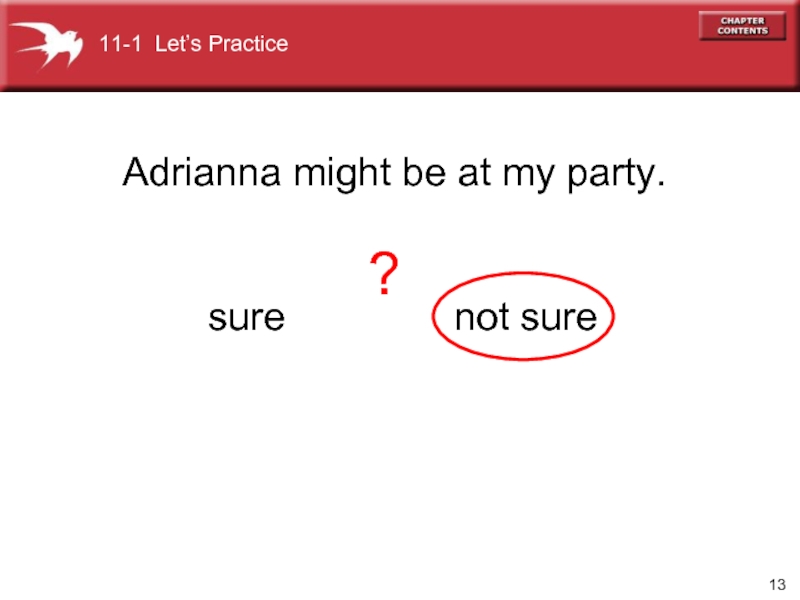
Слайд 14She might go to Hong Kong on Monday.
Yung won’t
be at the party.
11-1 Let’s Practice
not sure
sure
?
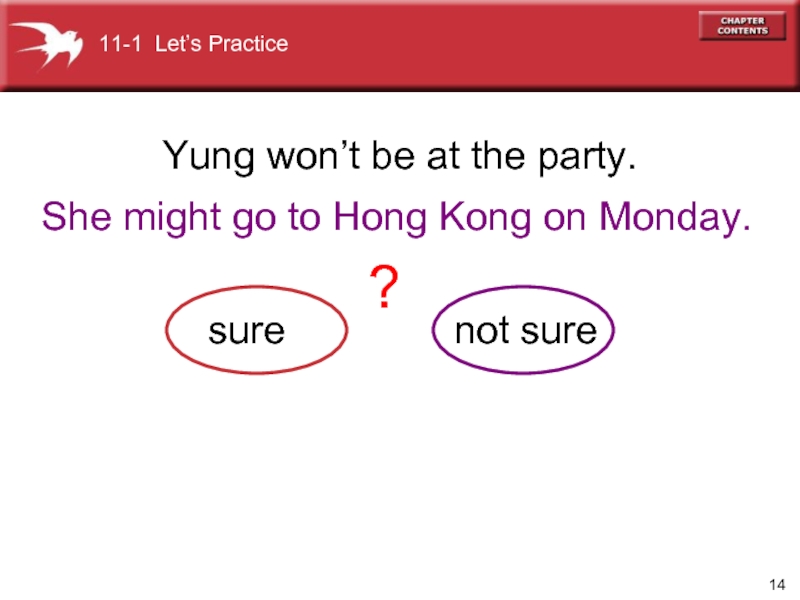
Слайд 15
11-2 MAYBE (ONE WORD) vs. MAY BE (TWO WORDS)
Maybe he will
be in our class.
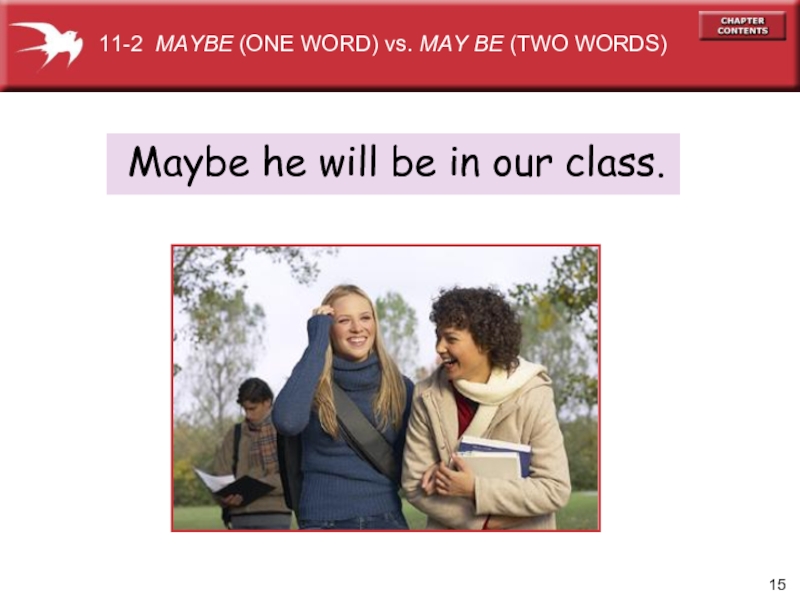
Слайд 16(b) Maybe he will be in our class.
adverb
S
V
(a) “Will he be
in our class?”
“I don’t know. Maybe. Maybe he will be
in our class, and maybe he won’t.”
Maybe = possibility
11-2 MAYBE (ONE WORD) vs. MAY BE (TWO WORDS)
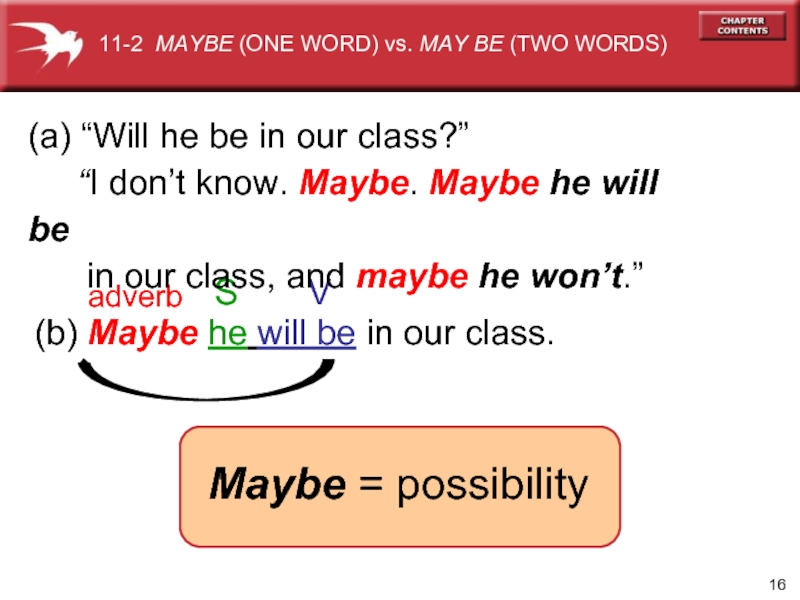
Слайд 17(c) He may be in our class.
V
S
(b) Maybe he will be
in our class.
adverb
S
V
11-2 MAYBE (ONE WORD) vs. MAY BE (TWO WORDS)
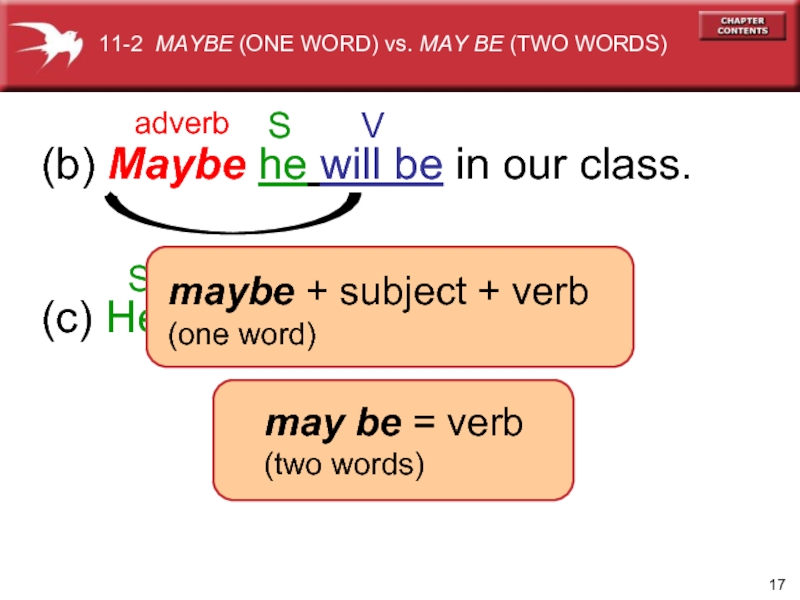
Слайд 18maybe
adverb
may
be
verb
11-2 MAYBE (ONE WORD) vs. MAY BE (TWO WORDS)
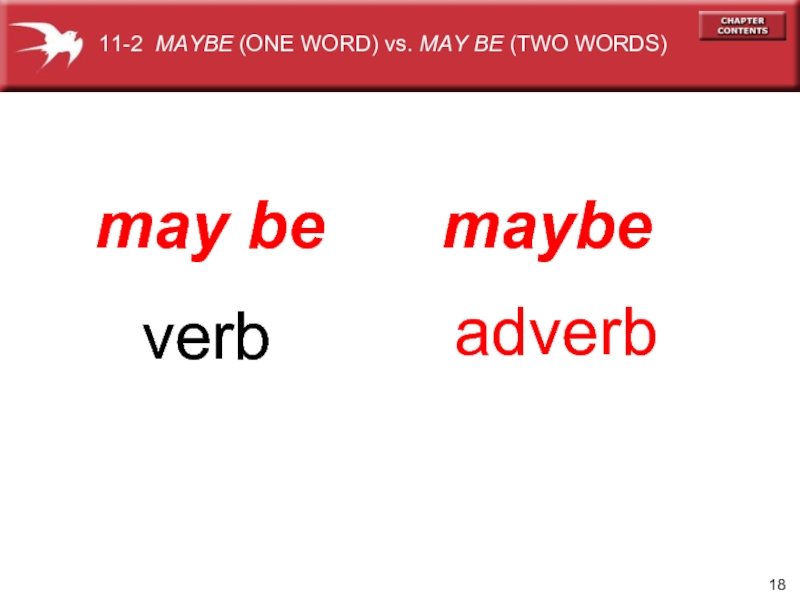
Слайд 19 It ______ fun to go rafting.
may be
maybe
may be
11-2
Let’s Practice
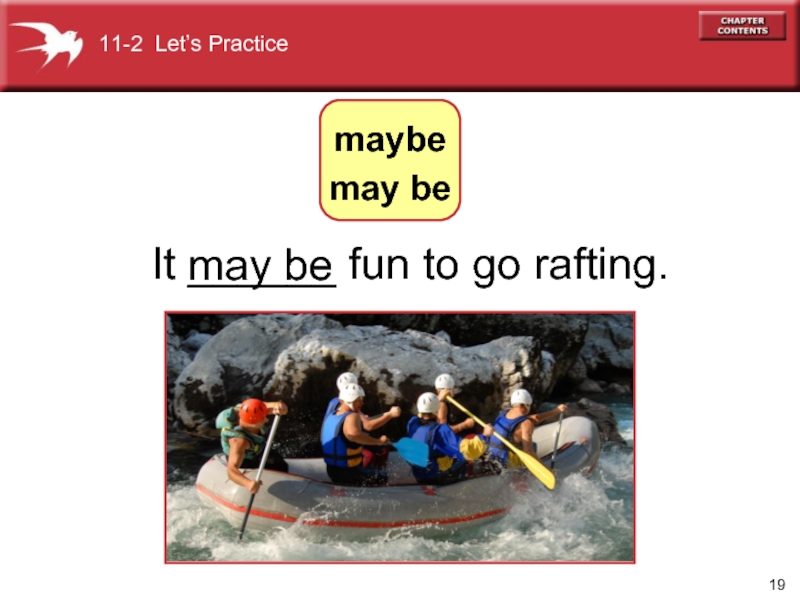
Слайд 20 Rafting ______ expensive.
may be
11-2 Let’s Practice
maybe
may be
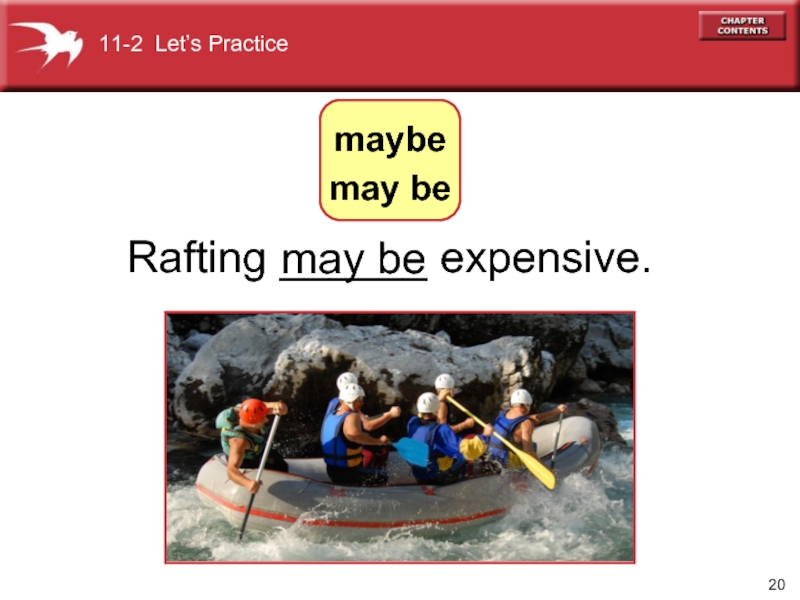
Слайд 21 ______ we have enough money
to go rafting.
Maybe
11-2 Let’s
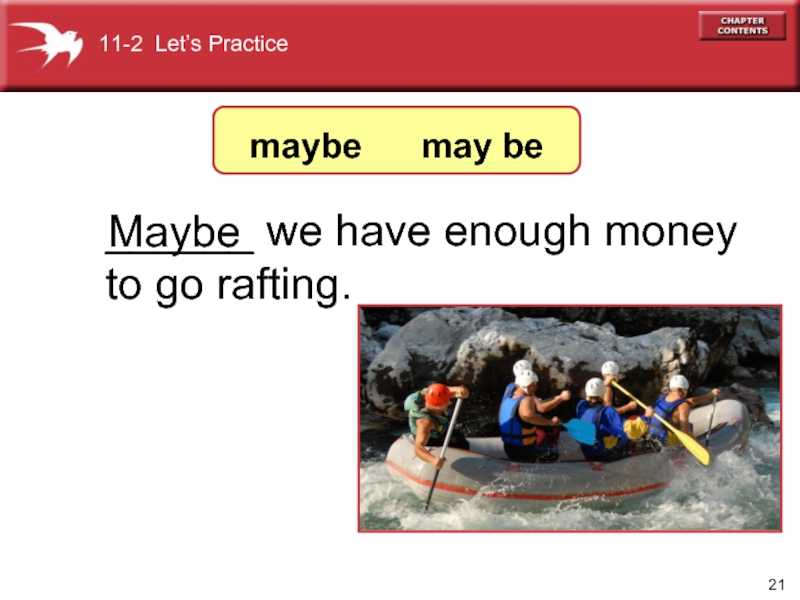
Слайд 22 The weather ______ bad tonight.
______ we will have bad weather.
Maybe
may be
11-2 Let’s Practice
maybe
may be
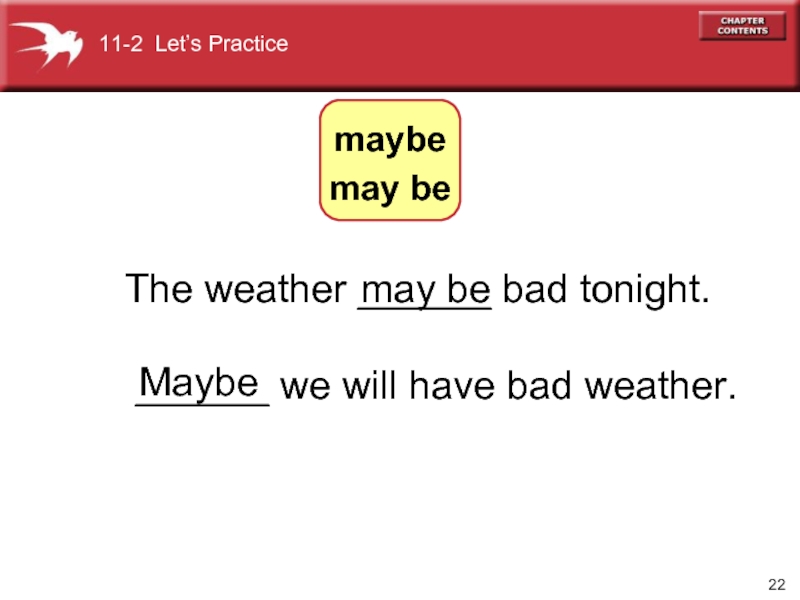
Слайд 23Before Kiara goes home today,
she will do her homework.
11-3 FUTURE TIME
CLAUSES WITH BEFORE, AFTER,
AND WHEN
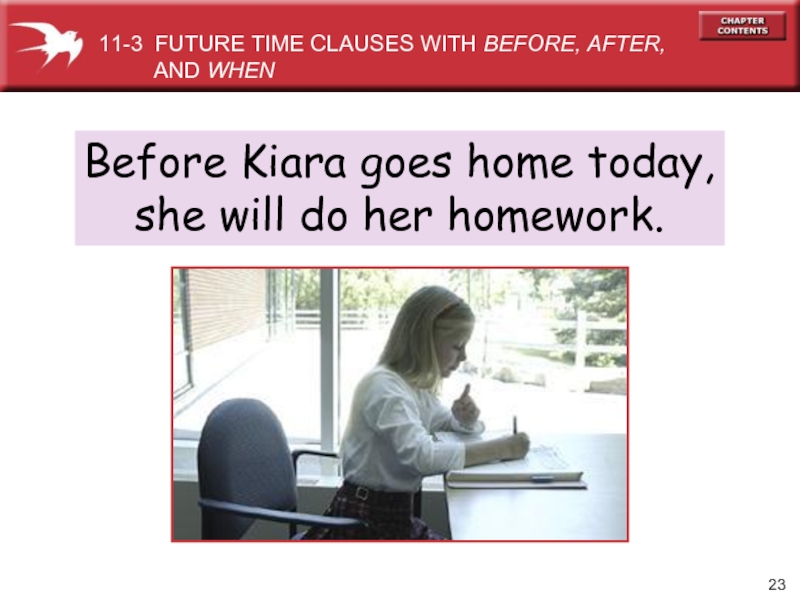
Слайд 24(a) Before Kiara goes home today,
she will do her homework.
SIMPLE PRESENT
future time clauses
(a) Before Kiara goes home today,
she will do her homework.
Before Kiara will go home today,
she will do her homework.
Before Kiara is going to go home today, she will do her homework.
?
?
11-3 FUTURE TIME CLAUSES WITH BEFORE, AFTER,
AND WHEN
in

Слайд 25(b) Kiara is going to go home today
a future time clause
after she does her homework.
11-3 FUTURE TIME CLAUSES WITH BEFORE, AFTER,
AND WHEN
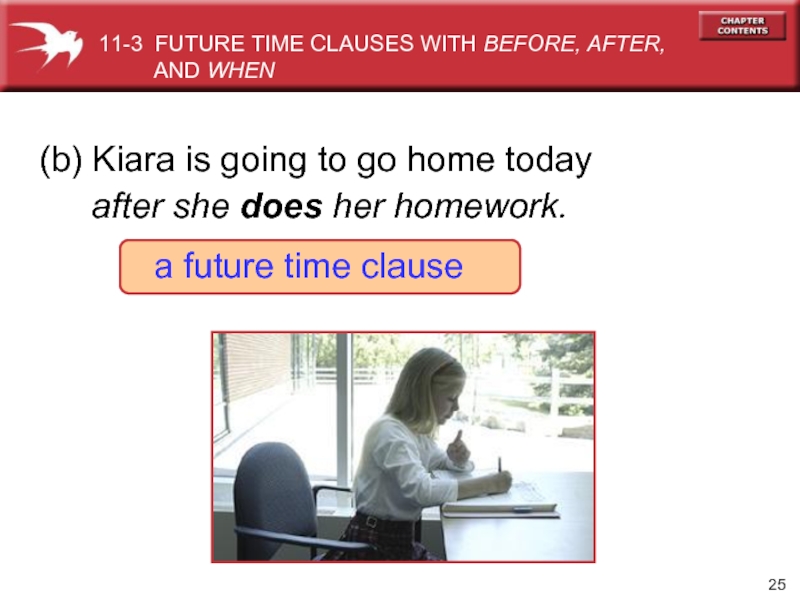
Слайд 26When I turn 21 next year
a
future time clause
11-3 FUTURE TIME CLAUSES WITH BEFORE, AFTER,
AND WHEN
, I’m going
(c)
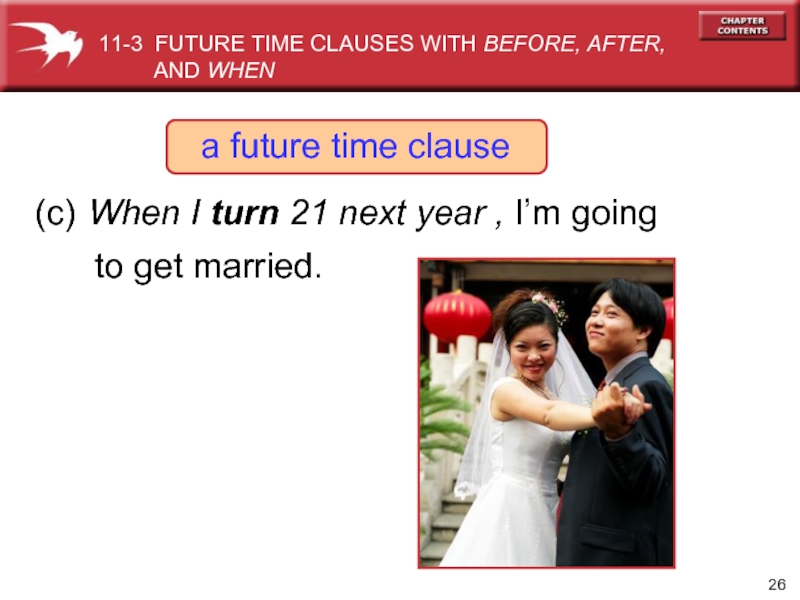
Слайд 27I’m going to go play outside
after I eat another cookie.
time clause
11-3
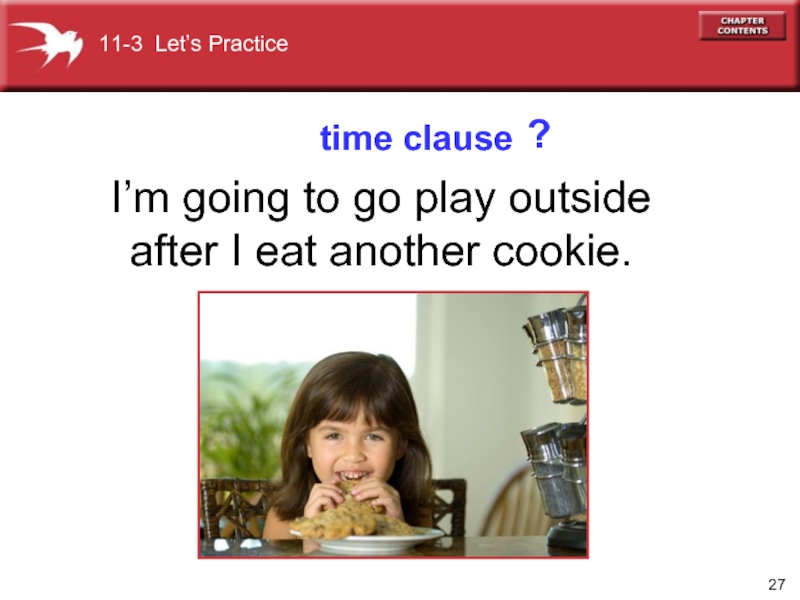
Слайд 28
, I’m going
to buy a scarf at the store.
11-3 Let’s Practice
time clause
Before I go home
?
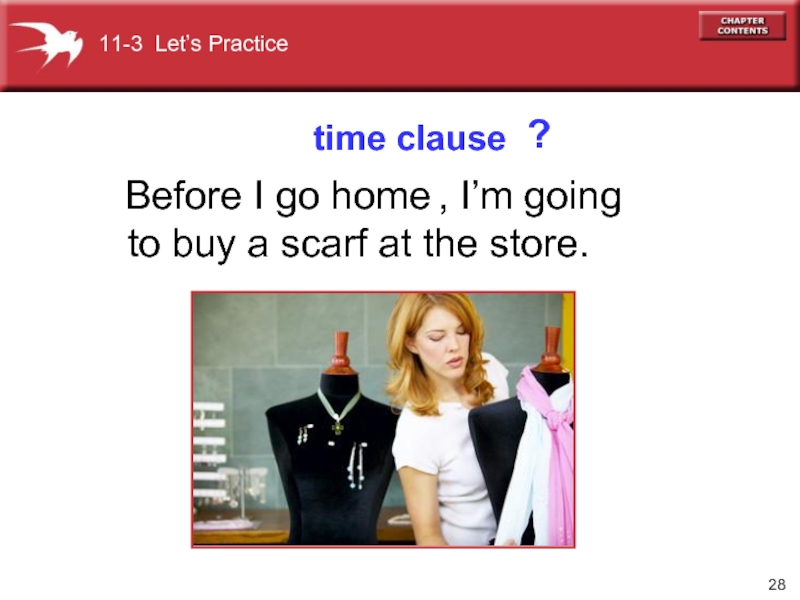
Слайд 29I’m going to be a doctor
after I finish medical school.
11-3 Let’s
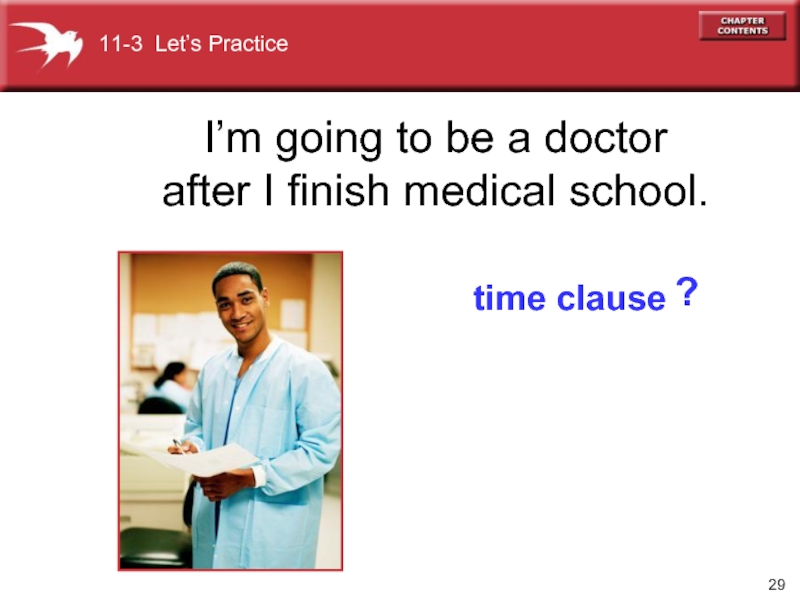
Слайд 30If you cut the carrots,
I’ll make the soup.
11-4 CLAUSES WITH IF
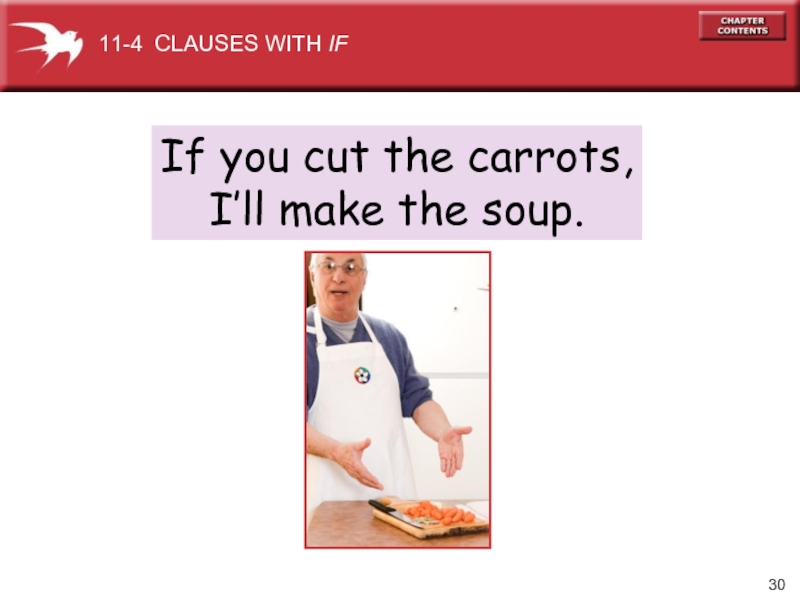
Слайд 31 If you cut the carrots,
(b) I’ll make the
soup
if-clause
I’ll make the soup.
(a)
main clause
if you cut the carrots.
main clause
if-clause
if-clause,
main clause
main clause
if-clause
11-4 CLAUSES WITH IF
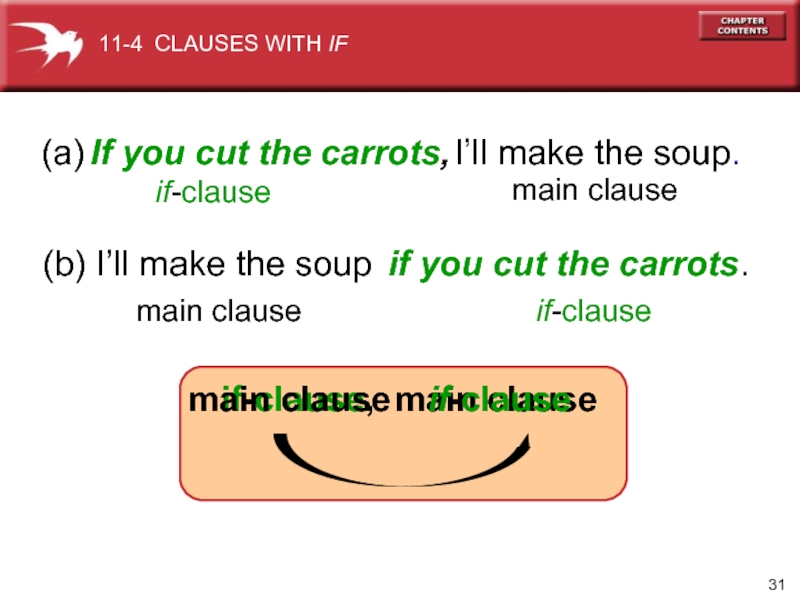
Слайд 32(d) If we don’t have class tomorrow, I’ll go skiing.
I’m
going to go on vacation.
if-clause
(c)
main clause
If I have enough money,
main clause
if-clause
SIMPLE PRESENT
in if-clauses
future time
11-4 CLAUSES WITH IF
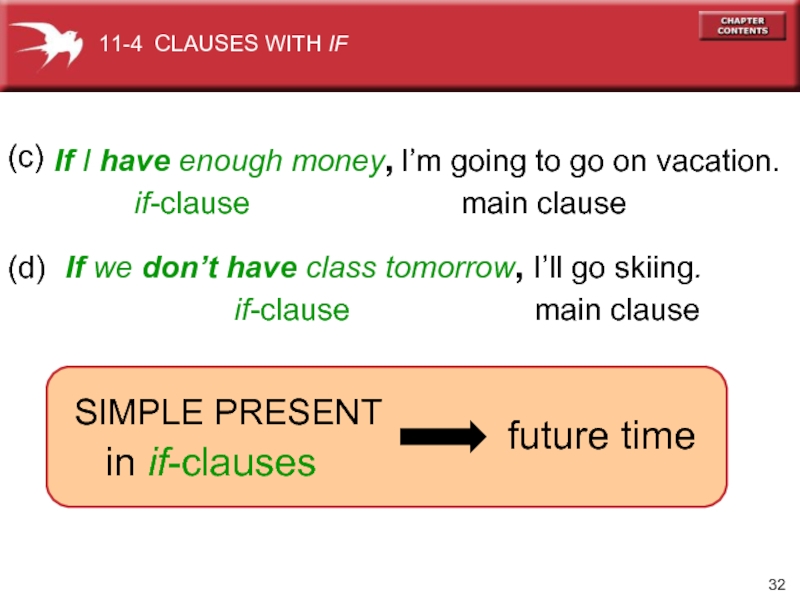
Слайд 33If she ____ us, we ________ her house.
pays
will clean
pay
clean
11-4 Let’s
Practice
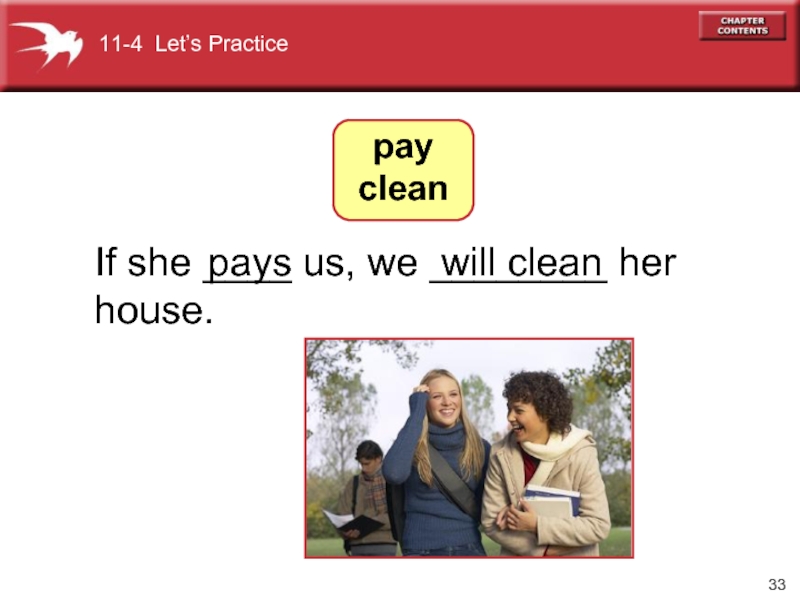
Слайд 34
She ________ great food if
she _______ that chef.
marries
will eat
11-4
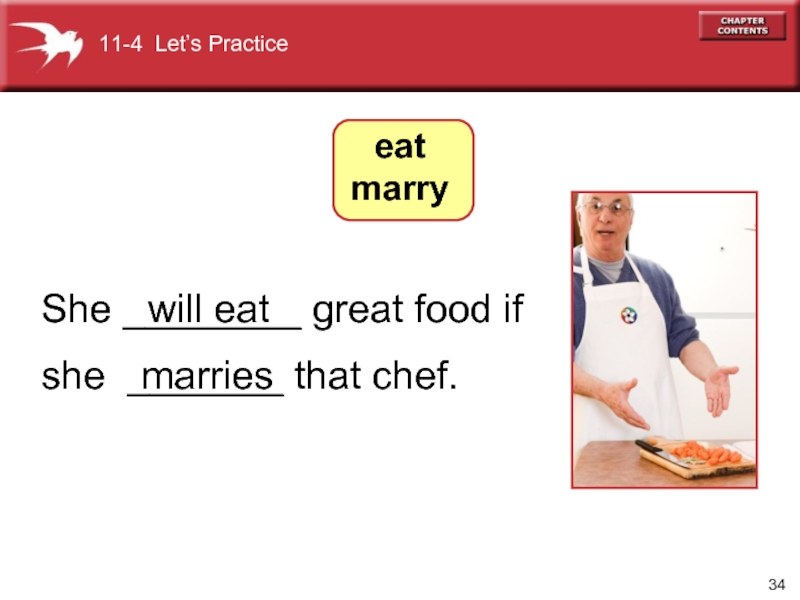
Слайд 35If Jacob ______ to speak Italian,
he ______________ to Italy.
learns
is going to move
will move
learn
move
11-4 Let’s Practice
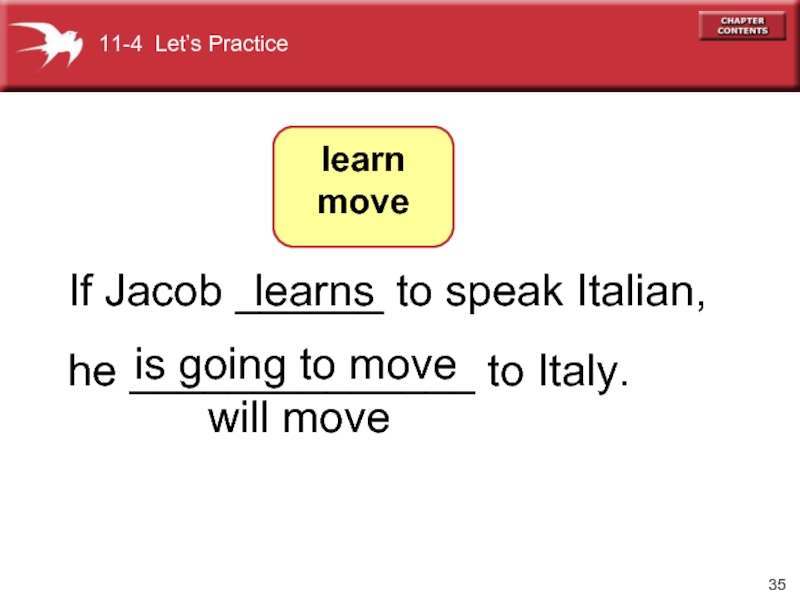
Слайд 36After I finish my work,
I play the piano.
11-5 EXPRESSING HABITUAL
PRESENT WITH TIME
CLAUSES AND IF-CLAUSES
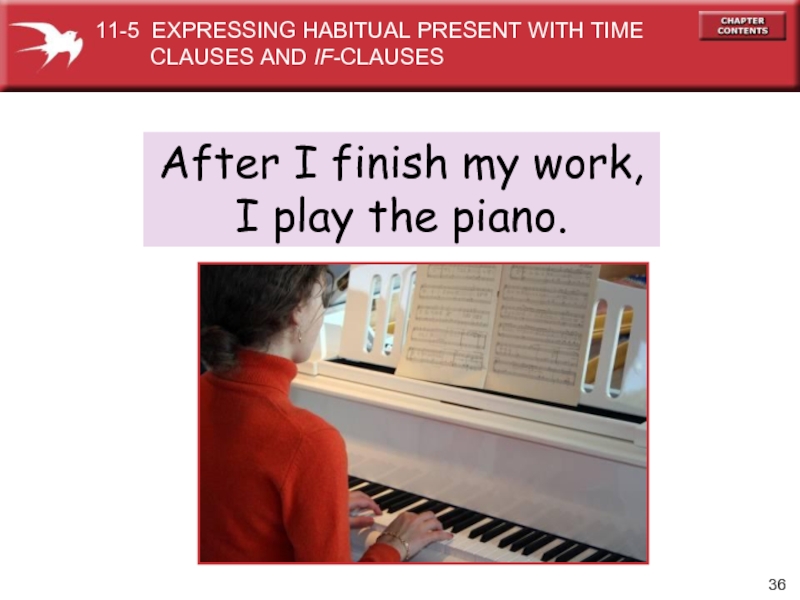
Слайд 37
(a) FUTURE
(b) HABITUAL
PRESENT
simple present
— in the
time clause
After Meg does her homework
(every day), she always plays
the piano.
simple present
— in both clauses
After Meg does her homework,
she will play the piano.
11-5 EXPRESSING HABITUAL PRESENT WITH TIME
CLAUSES AND IF-CLAUSES
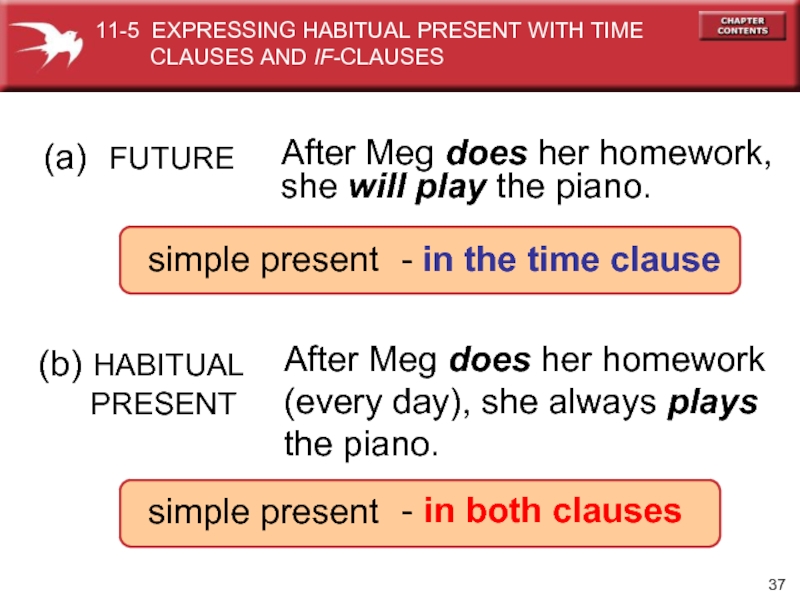
Слайд 38
(c) FUTURE
(d) HABITUAL
PRESENT
simple present
— in
the time clause
If it snows ,I go skiing.
simple present
— in both clauses
I am going to go skiing.
11-5 EXPRESSING HABITUAL PRESENT WITH TIME
CLAUSES AND IF-CLAUSES
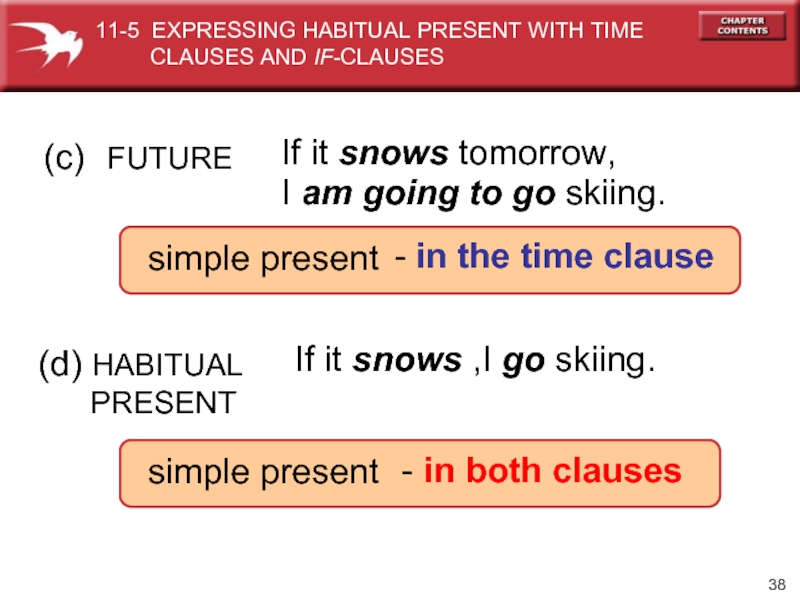
Слайд 39After Jeff ____ to the grocery store,
he is ____________ dinner.
going to cook
goes
go
cook
11-5 Let’s Practice

Слайд 40He always ____ to the grocery store,
before he ______ dinner.
cooks
goes
go
cook
11-5 Let’s Practice
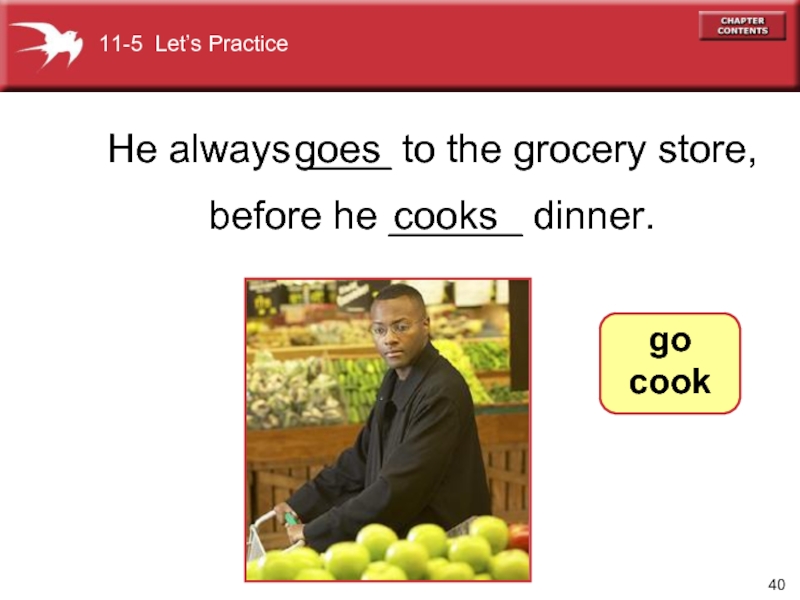
Слайд 41
If it __ sunny, she ______ sunglasses.
wears
is
be
wear
11-5 Let’s Practice
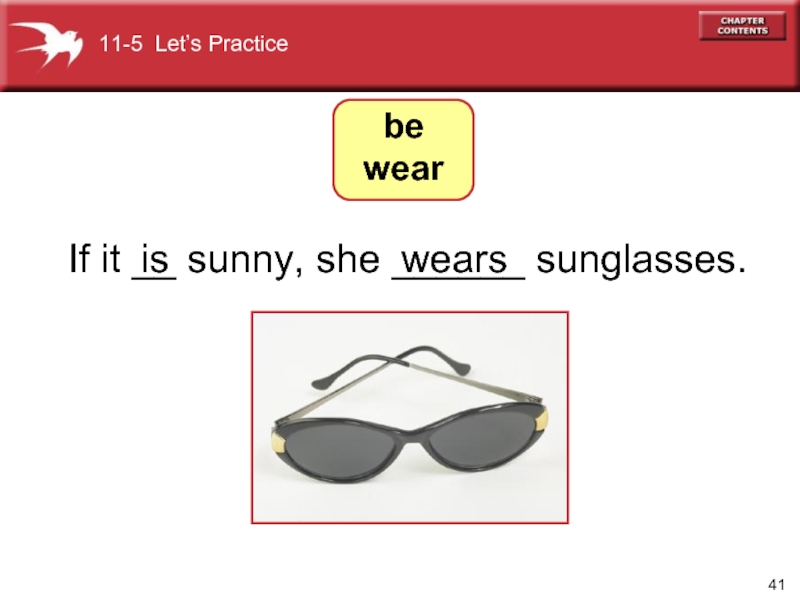
Слайд 42
What does he do every day?
11-6 USING WHAT + A FORM
OF DO

Слайд 43
(a) What does he do every day?
(b) What is he
doing right now?
He works in a hospital every day.
He is working in a hospital.
What +
about
activities
PRESENT
11-6 USING WHAT + A FORM OF DO
a form of do
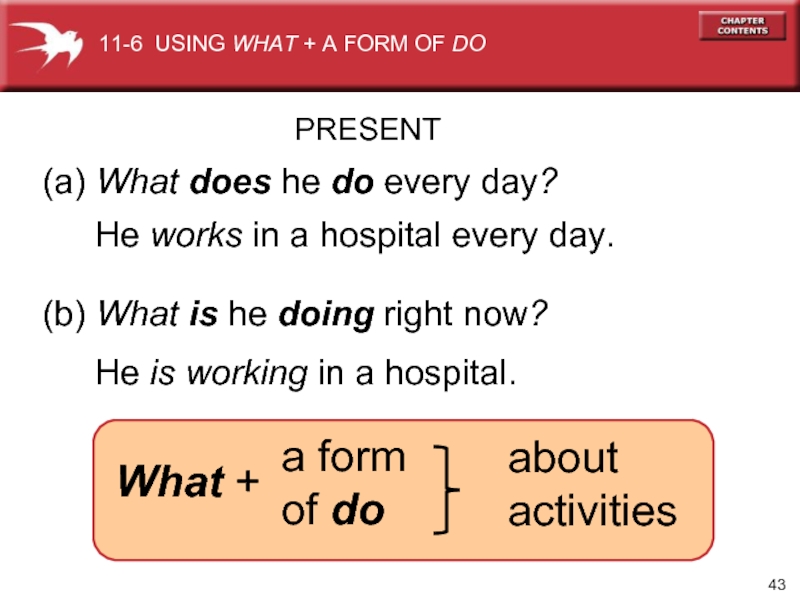
Слайд 44
(c) What does he do?
He is a doctor.
What do you
do? = What is your job?
11-6 USING WHAT + A FORM OF DO
PRESENT
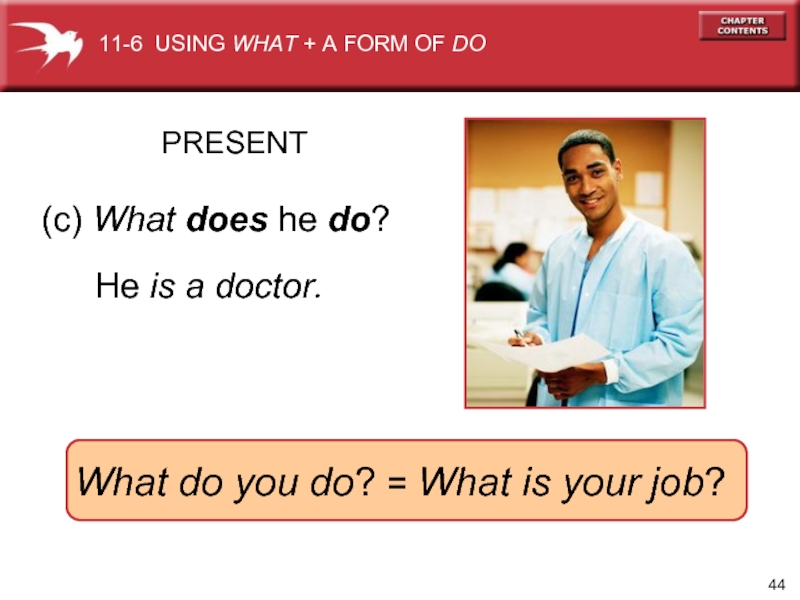
Слайд 45(d) What did she do yesterday?
She flew to Alaska.
11-6 USING WHAT
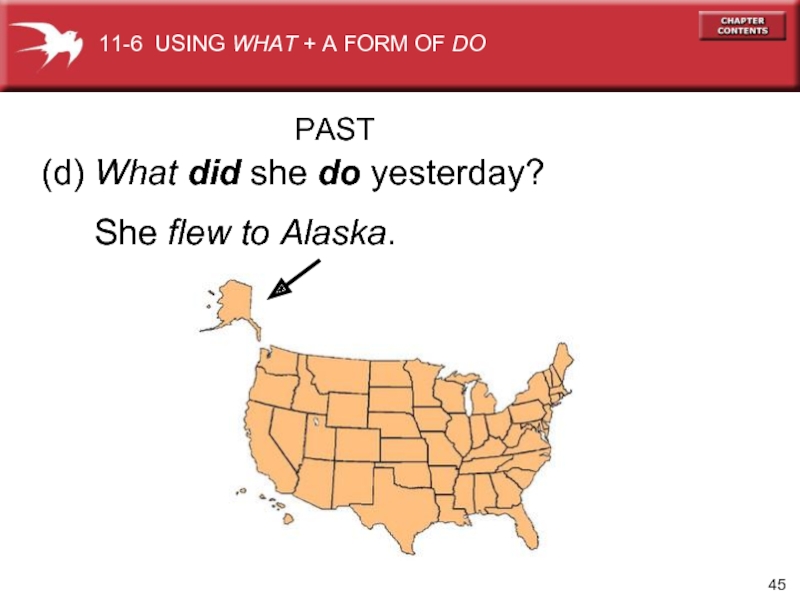
Слайд 46(e) What are you going to do next week?
I’m going to
paint my bedroom.
11-6 USING WHAT + A FORM OF DO
FUTURE

Слайд 47(f) What will we do if the lights go out?
We’ll use
candles.
11-6 USING WHAT + A FORM OF DO
FUTURE
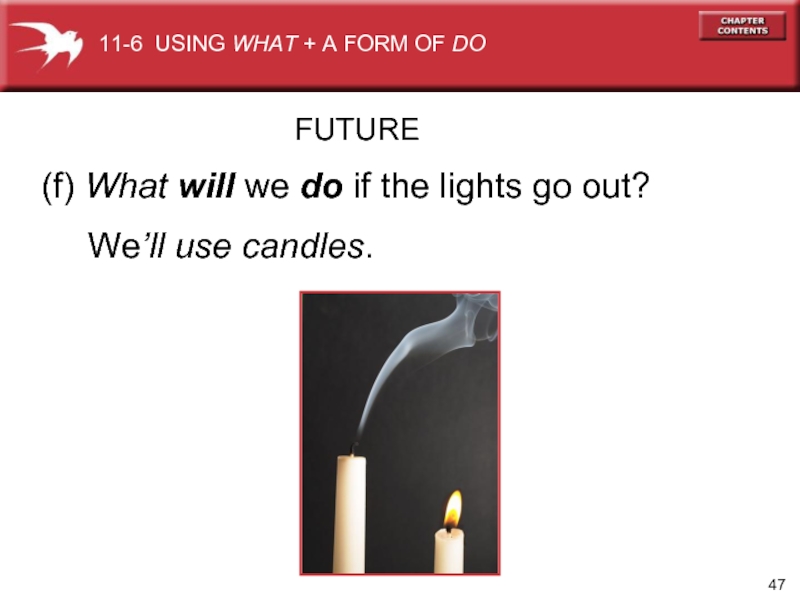
Слайд 48They _________ on Saturdays.
What _________ on Saturdays?
do they do
they
do
play golf
11-6 Let’s Practice
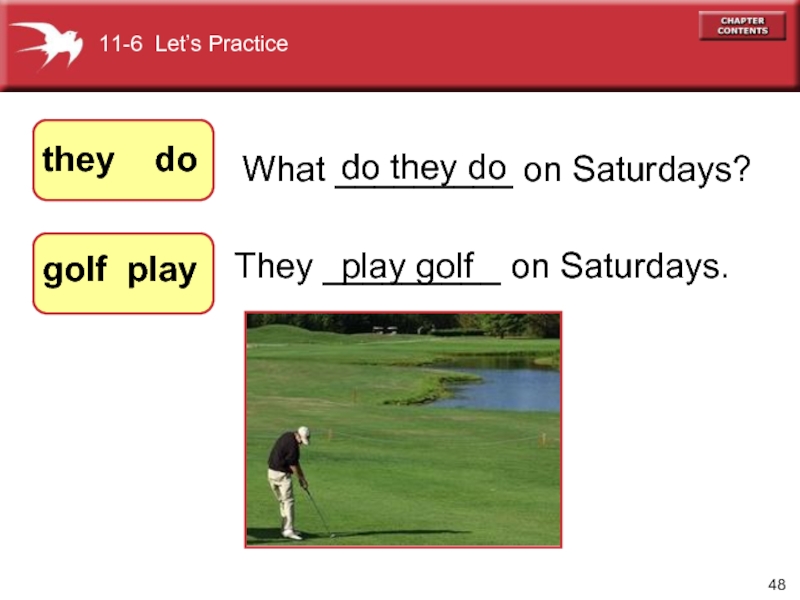
Слайд 49They __________ next Saturday.
What _________ next Saturday?
will they do
they
do
will play golf
11-6 Let’s Practice
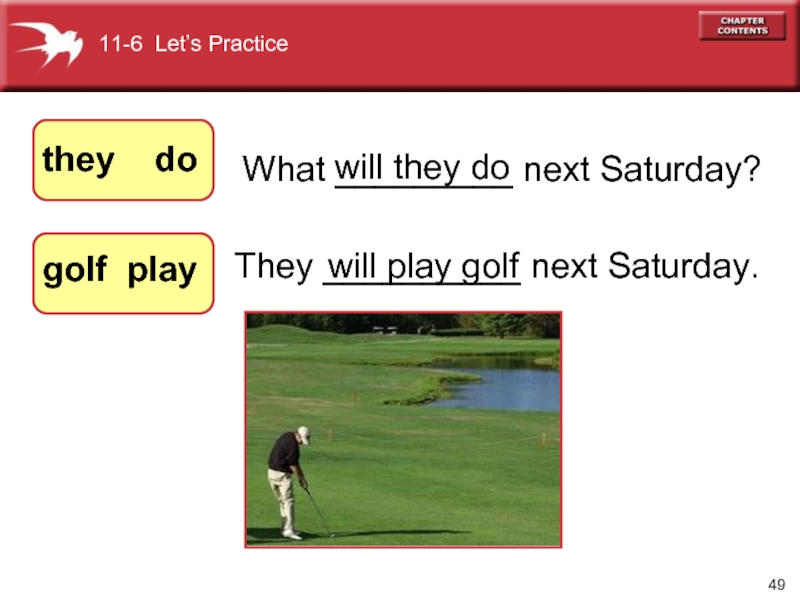
Слайд 50He _________.
What _______ do? (job)
does he
he do
is a doctor
11-6 Let’s Practice
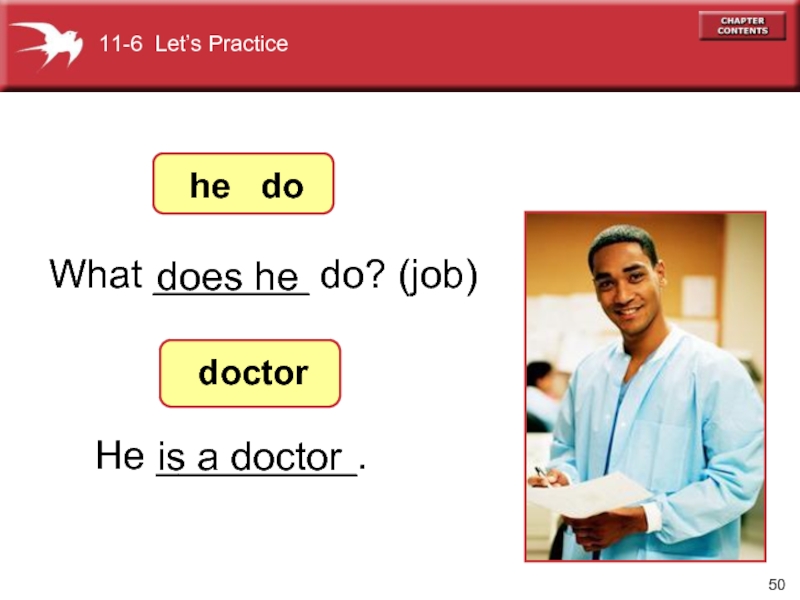
Слайд 51 Images used under license from:
Shutterstock, Inc.
Clipart.com
PHOTO CREDITS

You may be confused about the difference between maybe and may be. Or maybe you’re not. Either way, one space can make the difference between a verb meaning “might be” and an adverb meaning “possibly” or “perhaps.”
In this article, we’ll break down why that space matters so much, and we’ll give you some examples to show exactly what the difference is, as well as tips and tricks for remembering when to use each one.
⚡Quick summary
Maybe is an adverb meaning “perhaps.” May be is a verb phrase that generally means the same thing as “might be.”
What does maybe mean?
Maybe means “possibly” or “perhaps.” It often functions as an adverb, which in grammatical terms is a word that modifies (describes) a verb (among other functions). Maybe is commonly used to describe the probability of an action happening or not happening—maybe means it might or it might not happen. In other cases, it just means “perhaps.” These senses of maybe can be used anywhere in a sentence—the beginning, middle, or end. Maybe I’ll join you after all. Do you think maybe we could go home early? This tastes like an apple, or a pear, maybe.
Other senses of the word can stand on their own as an answer to a question. Maybe is famously used as a middle ground between yes and no. If you’re not definitely sure that something is a yes or a no, you can say maybe. Do you want to go to the dance with me? Maybe. It’s usually the same as answering a question with possibly or perhaps. Will it rain later? Maybe.
This sense of the word has led to its informal use as a noun meaning “an answer of maybe,” as in It’s not a yes but it’s a maybe, so at least it’s not a no.
What does may be mean?
May be isn’t a single word, nor is it used like one—it’s two separate words used together. Like maybe, it expresses uncertainty, but unlike maybe, it functions as a verb.
It’s essentially the same as might be, and it used to indicate that something is uncertain but has a chance of being true (He may be who he says he is) or being what happens (You may be asked to help).
Sometimes, it can be used to express comparison, as in You may be the top earning employee, but I’m the boss or That may be true, but it’s unkind.
In many cases, you can reword a sentence to use may be instead of maybe, and vice versa. For example, instead of saying That may be true, you could say Maybe that’s true.
It’s no coincidence that may be and maybe are used in such similar ways—maybe derives from squishing together may be.
Two words that shouldn’t be squished together are “a lot.” Do you know the difference between a lot, allot … and alot?
What is the difference between maybe and may be?
Remember, maybe is an adverb, and it’s used alongside verbs or as a standalone answer to a question. May be functions as a verb.
If you can replace the term with possibly or perhaps, use maybe. If you can replace the term with might be, use may be.
Examples of maybe and may be used in a sentence
Check out these example sentences that will help you remember when to use maybe and when to use may be.
- Yes, we’re losing money, but maybe sales will rally in the fourth quarter.
- We may be losing money, but we’re not going to quit yet.
- I should go check the faucet—it may be dripping again.
- I should go check the faucet—maybe it’s dripping again.
- It may be about to rain, but maybe it will pass us by.
Take the Quiz: Do you know when to use maybe and may be?
If you’re feeling certain about using maybe and may be, head over to our quiz on this confusing pair.
A compound word is two or more words combined to form a new word. There are many compound words in English, like windmill, strawberry, granddaughter, and maybe.
Maybe also has a near homophone in the phrase may be. Since, in this case, the words are kept separate, it is no longer a compound word. May be is actually a verb phrase.
Is the compound word maybe and the phrase may be ever interchangeable? Continue reading to find out.
What is the Difference Between Maybe and May Be?
In this article, I will discuss the difference between these two: maybe vs. may be. I will give an example of each in a correct sentence. Plus, I will reveal a useful trick to use when you can’t decide whether may be or maybe is appropriate.
When to Use Maybe

For example,
- “Maybe later on, you and I can go swimming together down at the holler,” Susanna offered.
- “Maybe,” Tom replied, “but Pa needs me to put the cows out to pasture first.”
- Maybe what you can go online and get tomorrow. (Told you some things had changed.) Maybe what you could buy your partner (ditto). Maybe what to put on a wish list. –The New York Times
When to Use May Be

May be consists of the verbs may and be, which are separate words here, and which refer to something that could happen or a state of affairs that might exist.
For example,
- I may be young, but I am wise beyond my years.
- Mia may be going to the beach today, but only if she doesn’t have to drive herself.
- Rapidly melting Greenland may be shedding its ice even faster than anyone suspected, new research suggests. –The Washington Post
Trick to Remember the Difference
Still confused? Here is a helpful trick to remember may be vs. maybe
May be and maybe are two different parts of speech, and they can’t be substituted for each other.
- May be is a verb phrase.
- Maybe is an adverb.
In the chart below, I isolated the usage of may be and maybe as verbs by graphing usage of the phrases “maybe true” and “may be true” using Google Ngrams.
As you can see, maybe is never used as a verb. This chart references books written in English since 1800, so it’s not compete or scientific, but it’s accurate enough to identify long-term usage patterns.
You can remember to only use the phrase may be as a verb since it contains two separate verbs. By looking at the parts of speech contained in this phrase, it will be easy to know how to use it in a sentence.
Summary
Is it maybe or may be? While these words contain all of the same letters, they do function as different parts of speech, and they cannot be substituted for each other.
- Maybe is an adverb that means possibly or perhaps.
- May be is a verb phrase that indicates something that might happen or a potential state of affairs.
Since the verb phrase may be contains two separate verbs, you will always remember not to use it as an adverb. Likewise, maybe is only ever an adverb, and never a verb.
If you are still confused, you can always refer back to this article to help you remember, and for guidance on whether maybe or may be is the word you want to use.
Contents
- 1 What is the Difference Between Maybe and May Be?
- 2 When to Use Maybe
- 3 When to Use May Be
- 4 Trick to Remember the Difference
- 5 Summary
-
#1
Hello, my friends,
I was taught that the word maybe should be put at the beginning of the sentence, but someone told me it can also be put in the middle of the sentence:
«I am maybe too late.»
Thoughts and context: I used to think I should write it this way: Maybe I am too late. I said this to my friend to figure out the cause for their unhappiness: being too late.
-
#2
«I am maybe/ perhaps/ possibly too late». You can use that word order.
-
#3
«I am maybe/ perhaps/ possibly too late». You can use that word order.
Got it. Thank you very much.
-
#4
I can’t disagree about BE (post #3) but in AE, I consider this sentence ungrammatical. I don’t think I have ever heard it used.
Both «Maybe I am too late.» and «I am probably too late.» are common.
Perhaps your friend was referring to «I may be too late.» That is also common. Or perhaps he got the phrase from BE.
-
#5
I can’t disagree about BE (post #3) but in AE, I consider this sentence ungrammatical. I don’t think I have ever heard it used.
Both «Maybe I am too late.» and «I am probably too late.» are common.
Perhaps your friend was referring to «I may be too late.» That is also common. Or perhaps he got the phrase from BE.
How about the use of perhaps? Someone told me it should be put at the beginning of the sentence.
-
#6
I agree the original is a strange sentence. I may be too late seems a more natural choice.
(cross-posted)
-
#7
I agree the original is a strange sentence. I may be too late seems a more natural choice.
(cross-posted)
What if I use another verb:
I maybe give you a chance this time. (I told my students there was some possibility for him to take a make-up test.)
-
#8
Do you mean Perhaps/Maybe I’ll give you or I may give you?
-
#9
Do you mean Perhaps/Maybe I’ll give you or I may give you?
I know perhaps and maybe can be used at the beginning of the sentence but I want to help my students distinguish «maybe» from «may be». As far as I can see, maybe and perhaps are usually used at the beginning but not the middle of a sentence so I try to tell the students «maybe» has the same meaning of «may be» but their positions are different.
Last edited: Jun 14, 2016
-
#10
Maybe I give you does not work! You have to say I wll give you.
-
#11
Maybe I give you does not work! You have to say I wll give you.
I see. How about my question in #9.
-
#12
With reference to your post 9, I would say that «maybe» and «may be» are not the same. «Maybe» which means «perhaps» is an adverb. It is a single word. It often comes at the beginning of a sentence, but not always. «Powerful and effective, it is maybe their finest piece of songwriting to date.»
«May be» (two words) is a modal verb followed by either a main verb or an auxiliary verb. «This may be the last chance I get to play for England»; «He may be going overseas for a while».
You cannot replace the «may be» with «perhaps». You would need to use another verb if you used «perhaps» or «maybe». («This will be perhaps / Perhaps this will be the last chance I get to play for England»; «Perhaps he will be going overseas for a while» — for example).
See: Maybe or may be ? — English Grammar Today — Cambridge Dictionaries Online
Last edited: Jun 14, 2016
-
#13
With reference to your post 9, I would say that «maybe» and «may be» are not the same. «Maybe» which means «perhaps» is an adverb. It is a single word. It often comes at the beginning of a sentence, but not always. «Powerful and effective, it is maybe their finest piece of songwriting to date.»
«May be» (two words) is a modal verb followed by either a main verb or an auxiliary verb. «This may be the last chance I get to play for England»; «He may be going overseas for a while».
You cannot replace the «may be» with «perhaps». You would need to use another verb if you used «perhaps» or «maybe». («This will be perhaps / Perhaps this will be the last chance I get to play for England»; «Perhaps he will be going overseas for a while» — for example).
See: Maybe or may be ? — English Grammar Today — Cambridge Dictionaries Online
Got it. Thank you very much.
-
#14
I try to tell the students «maybe» has the same meaning of «may be» but their positions are different.
I think (in many sentences) «maybe» is a replacement for (and has the same meaning of) «it may be that».
Maybe you’re wrong.
It may be that you’re wrong.
Maybe I am too late.
It may be that I am too late.
I am maybe too late.
I am it may be that too late.
If you are going, maybe I will too.
If you are going, it may be that I will too.
I maybe give you a chance this time.
I it may be that give you a chance this time.
-
#15
I think (in many sentences) «maybe» is a replacement for (and has the same meaning of) «it may be that».
Maybe you’re wrong.
It may be that you’re wrong.Maybe I am too late.
It may be that I am too late.I am maybe too late.
I am it may be that too late.If you are going, maybe I will too.
If you are going, it may be that I will too.I maybe give you a chance this time.
I it may be that give you a chance this time.
So is the use of perhaps?
-
#16
Both maybe (and perhaps) and may be are used to express uncertainty.
But although maybe and perhaps have the same meaning, you don’t often see maybe in writing in BE.
The fact that maybe is an adverb and may be a verbal structure also means that they cannot simply be interchanged.
One important difference is that Maybe can be used as a one-word sentence, while may be cannot.
-
#17
Both maybe (and perhaps) and may be are used to express uncertainty.
But although maybe and perhaps have the same meaning, you don’t often see maybe in writing in BE.The fact that maybe is an adverb and may be a verbal structure also means that they cannot simply be interchanged.
One important difference is that Maybe can be used as a one-word sentence, while may be cannot.
Got it. Thank you very much.
In a comment to a previous post I was asked to write about the difference between the words: “maybe” and “may be.” That is what I am going to do today!
To begin with let’s talk about the different parts of speech that these two words represent: “maybe” (one word) is an adverb and “may be” (two words) is a verb phrase.
The word “maybe” has the same meaning as the word “perhaps” or “possibly.” These three words are synonyms. Therefore “perhaps” and “possibly” are words that can easily be substituted for the word “maybe” in a sentence.
Here are some example sentences using the word “maybe” and explanations:
Maybe we are all going the wrong direction. = Perhaps we are all going the wrong direction.
Maybe, I’m not sure yet. = Probably, I don’t know yet.
The words “may be” represent a verb phrase in which the modal verb ‘may’ expresses possibility and sometimes suggests permission.
Jaime may be here. = It is possible that Jaime is here.
This may be the best ESL blog ever. = This is possibly the best ESL blog ever.
You may be allowed to enter. = You may have permission to go in.
In a sentence after the verb phrase “may be” you will usually find an adjective, a noun, or a verb ending in -ing.
She may be German. (may be + adjective)
She may be a magician. (may be + article + noun)
She may be working too much. (may be + verb ending in -ing)
So, how are you going to remember the difference between these words. Here are some tricks:
“Maybe” and the word “adverb” are each one word, so they go together.
“May be” and “verb phrase” and each two words, so they go together.
Also, if you are unsure if you should use the word “maybe” or the phrase “may be,” in a sentences you can see if the word “perhaps” fits in the sentence instead. If you can put the word “perhaps” into a sentence and it still makes sense then you should be using the word “maybe” in that same sentence.
Maybe you have some other hints or ideas about how to tell these two words apart, if so please share them with us all in the comments on this post.
It may be that you are looking for more ways to learn English? If so be sure to connect to Transparent Language’s main website and Facebook page.

